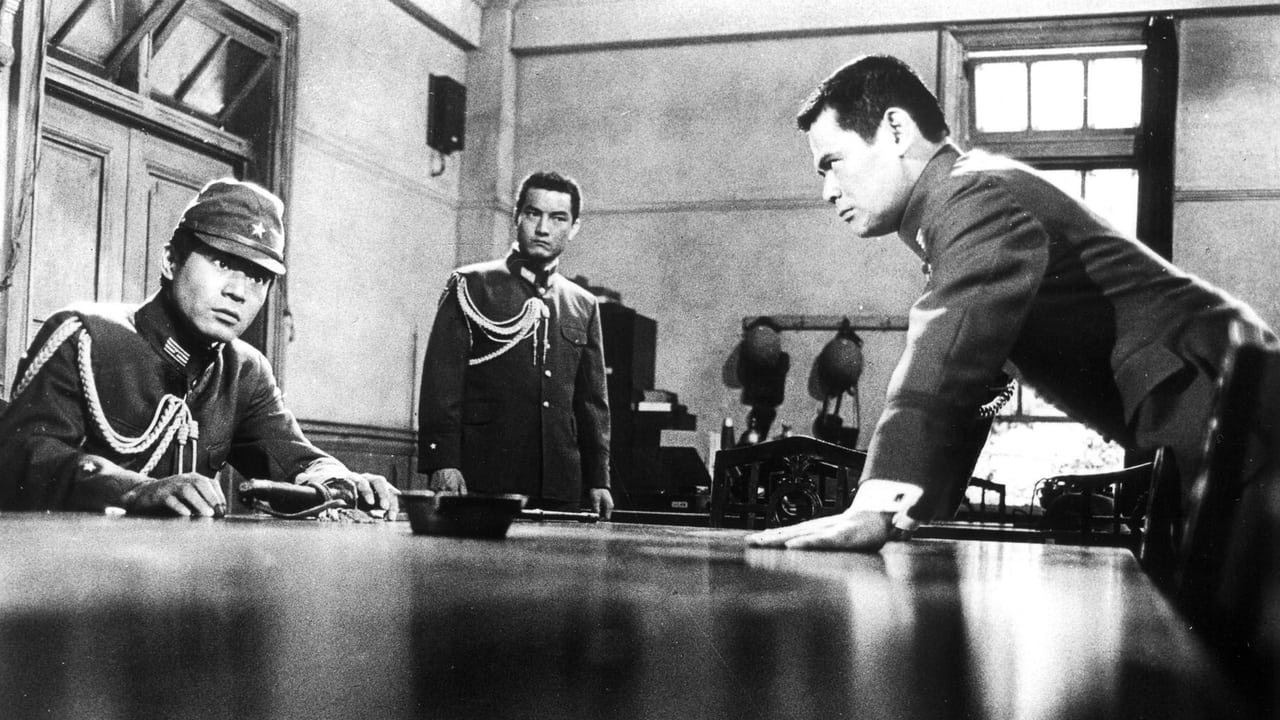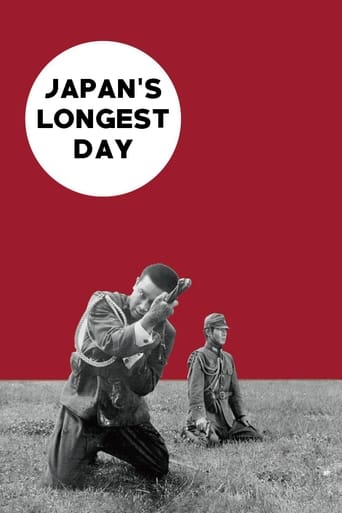

What makes it different from others?
... View MoreSadly Over-hyped
... View MoreThe movie runs out of plot and jokes well before the end of a two-hour running time, long for a light comedy.
... View MoreIt's a movie as timely as it is provocative and amazingly, for much of its running time, it is weirdly funny.
... View MoreFirst off I would say you will want to watch this movie more than once for a couple of reasons. Main one for me is in reading the sub-titles etc. I missed out on a lot of the action and byplay of the various actors. Unless you are fluent in Japanese, you have to read to follow the plots, of which there are many. The subtitles pass so quickly that I was just getting the gist of the dialog in some spots, so I will need to watch again now that I have it down fairly well. There are so many roles to follow and all of them are interesting, so you don't want to let anyone fall away as he returns later in the film and you will want to remember what he was doing earlier in the movie. All are based on real people of the times, and very real events. As the story progresses I was caught up in the increasing action and urgency of the rebellion. The young officer who is so deeply involved and is such a zealot for the army continuing to fight is truly frightening as you can see some of this rabid resolve right now in some of these Jihad warriors in the mid-east. Just goes to show that Berserkers are not only from the days of Viking raiders. By the way this movie is not suitable for young viewers, it is matter of fact, but graphic in various death scenes.
... View MoreBy mid-August 1945 Japan's leaders knew that defeat in the "Greater East Asia War" was inevitable. The fire-bombings of Tokyo, the deployment of atomic bombs against Hiroshima and Nagasaki, and the Soviet Union's entry into the war against Japan underscored this reality. Yet there were two major impediments to Japan's surrender: bureaucratic paralysis and a looming coup attempt from within the armed forces. The first half of Japan's Longest Day chronicles the first of these obstacles with a high degree of historical accuracy (compare with Tsuyoshi Hasegawa's non-fiction book "Racing the Enemy," published in 2005). Chishu Ryu, Toshiro Mifune, and Takashi Shimura, familiar faces from many Yasujiro Ozu and Akira Kurosawa movies, portray members of Japan's divided cabinet with dignity and gravitas. Unfortunately, the second half of the movie unfolds more slowly than the first despite a great deal of shouting and violence during the coup attempt, and the script makes little attempt to situate the would-be army revolt in a philosophical or historical context. The film's final moments slip even further into myopia: Japan's military and civilian deaths are tallied, but no mention is made of the millions of deaths inflicted by Japan's armed forces in Asia. Despite these shortcomings, Japan's Longest Day is well worth watching for those with an interest in Japanese cinema or the end of World War II in the Pacific.
... View MoreWhether you already know about the events of the day of the Japanese surrender on August 15th 1945 or you are a newcomer to the topic, this film has something for both.Most film goers get to see the good guy side of films and rarely get to see a film made by the losers of war and the way they thought and felt. I've seen a few of these films from Japan and Germany and it's eye opening to see their mindsets during this period.Right off your gonna get a pretty clear picture that the Military ran the show. The Prime Minister of Japan was the guy who made the decisions along with the cabinet but Japan back in this time...was almost..if not...a military state. Behind the scenes you will see military men who know no other way of life, but it was all about to change...and they didn't react to well. I mean, who would enjoy surrendering? I know I wouldn't but what you get is an unruly few who think they have the will of the people and the emperor in mind when they decide to try and overthrow the Surrender Proceedings and takeover the Imperial Palace. Imagine being the most powerful force in the world for centuries and within a short span of 3 to 4 years...it's all over.It's just a fascinating watch all the way through to finally get to see what was in the minds of the Japanese Soldiers and Politicians during the last day before their surrender. Most accepted with regret..but with grace also. Others didn't take to it too well.If your looking for a war film with some action then you better look somewhere else cause this isn't that kind of film. This is war drama all the way. Watch this film and you'll get an idea of what it was like...back when "Japan's Longest Day" occurred.
... View MoreI had thought the title of this one was an American invention to capitalize off of the American film The Longest Day, but I do believe "Japan's Longest Day" is the actual title. It has nothing to do with the other film. It, in fact, depicts perhaps the most tense day in modern Japanese history, the 24 hours between August 14th and 15th, 1945. The simplified version of WWII history has the Japanese quickly surrendering with their tales between their legs after the Allies dropped the bomb on Hiroshima and Nagasaki, but a nation so wound up in nationalistic and militaristic pride wasn't ready to give up that easily. The film doesn't depict the citizenry one could imagine they would be mostly sick of war. But the military certainly was ready to go all the way, to have every person in Japan martyred. Emperor Hirohito, who is supposed to be looked upon as divine by his people, decided that his empire must surrender. Many of the heads of military only agree grudgingly. Many of their underlings rebel. Hirohito makes a recording of his surrender message, to be played at noon on the 15th. A group of soldiers tries to rally others not to listen, and they attempt a coup and try to steal the record. The film is long 2 hours and 37 minutes. We are given the names of every single character in the film I would venture to guess that over 100 names are thrown at us over the film, right up until the end. It's difficult to follow, but I don't believe it's necessary to understand every nuance of what was happening. The previous year, Kihachi Okamoto made what is probably his best (and best-known) film, Sword of Doom. Why choose him for this project? Well, there is at least one scene where that is pretty much answered (just remember that the Japanese soldiers still had samurai swords). Really, though, I don't think the direction is that impressive. As a film, it's nothing fantastic. But for the depiction of the minutiae of history, it's well worth watching. Toshiro Mifune, Takashi Shimura and Chishu Ryu all have large roles, but I honestly didn't even recognize them. They fade into these historical characters perfectly.
... View More